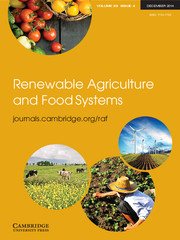Article contents
Agronomic performance of Pesticide Free Production under two crop rotations
Published online by Cambridge University Press: 12 February 2007
Abstract
Pesticide Free Production (PFP) is a pesticide reduction system that removes in-crop pesticide use on a yearly basis. A long-term study was established in 2000 to investigate the effect of crop rotation and frequency of inclusion on the success of PFP, as well as the effect of PFP on subsequent crops in the rotation. The crop rotations being compared were linola–oat–canola–wheat and linola–oat–alfalfa–alfalfa. PFP occurred either once in the rotation (oat) or twice (linola–oat). Weed density and yield were measured in the crops that followed PFP. Oat was a more successful PFP crop than linola because it was better able to compete with weeds. Furthermore, PFP oat had a higher weed density when it followed PFP linola, but this did not influence PFP oat yield. Under the conditions of this study, PFP linola was more successful in the annual crop rotation. Inclusion of alfalfa hay crops in the crop rotation was not effective in lowering weed pressure and, in fact, may have contributed to an increase in weed density. It is concluded that weed species present influenced the effectiveness of alfalfa in facilitating PFP, because major weeds in the study are not effectively controlled by alfalfa. PFP did not have a negative effect on following crops in the rotation (i.e. canola–wheat or alfalfa), regardless of whether one or two consecutive years of PFP occurred in the rotation. No additional herbicide was necessary for weed control in the crops that followed PFP; however, alfalfa hay was weedier for the first year following PFP. This study indicates that PFP is a viable way to reduce herbicide use in a cropping system and that attention needs to be paid to PFP crop selection and crop rotation, particularly when the PFP crop is less competitive with weeds.
- Type
- Research Article
- Information
- Copyright
- Copyright © Cambridge University Press 2005
References
- 6
- Cited by


